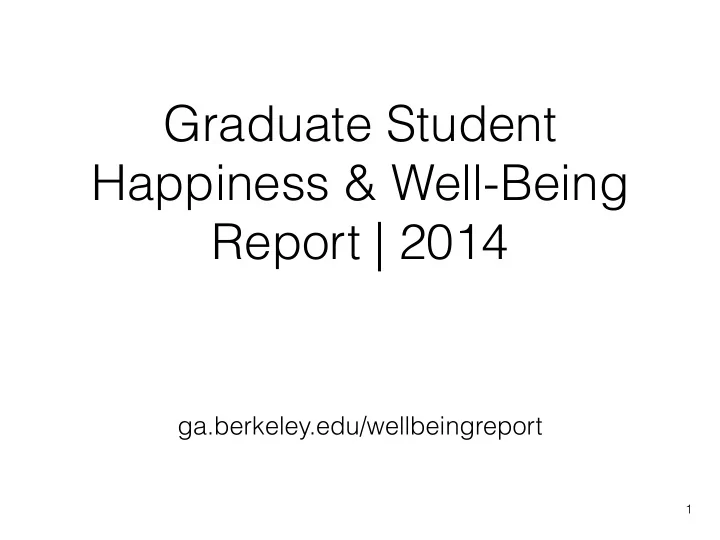

Graduate Student Happiness & Well-Being Report | 2014 ga.berkeley.edu/wellbeingreport 1
Background 3 years in the making Survey administered in Spring 2014 (n=790) First survey of grad well-being in 10 years 15+ briefings with faculty and administrators 2
Why Do We Care About Well-Being? To enable graduate students to do their best work and make the most of their time here. Balanced, happy people are more productive, more creative, more collaborative, better at long-term goal pursuit, more likely to find employment, more physically and psychologically resilient, and more. 3
Targeted Outcomes Satisfaction with Life Among the most widely-used well-being measures. 5 items, Diener et al., 1985 e.g. “The conditions of my life are excellent.” Depression From the Center for Epidemiological Studies and widely used in psychiatric epidemiology. 10 items (shortened), Radloff, 1977 e.g. “I could not ‘get going’.” 4
Working Model 30 candidate predictors for our two targeted outcomes are drawn from happiness and well-being literature, graduate student focus group & consults. Survey data behaves coherently, with 26 of 30 items related to our two outcomes in expected directions. 10 demographic items also included. 5
Top Predictors Depression Satisfaction with Life Living Conditions Sleep Career Prospects Overall Health Financial Confidence Academic Engagement Also: Social Support, Academic Progress & Preparation, Feeling Valued & Included in Department, and Advisor Relationship. Only these latter two top predictors and sleep are not shared by both models. 6
10 Overall Top Predictors 1. Career Prospects 6. Financial Confidence 2. Overall Health 7. Academic Progress & Preparation 3. Living Conditions 8. Sleep 4. Academic Engagement 9. Feeling Valued & Included 5. Social Support 10. Advisor Relationship 7
Perceptions about career prospects impact satisfaction with life 6 Satisfaction with Life (1-7) 5 4 3 2 1 Strongly Disagree Neither Agree/Disagree Strongly Agree “I’m upbeat about my career prospects.” (1-7) Average response is 4.5 (Neither/Slightly Agree) 8
“The largest source of anxiety for me is my post-grad job outlook. It is tremendously uncertain, and thus fear-inducing.” 9
“I don’t feel competitive or prepared in any way for academic jobs, and I think in some sense it is a failure of both my advisor and the graduate system to even admit people like me into PhD programs.” 10
Getting enough sleep to feel fully alert alleviates depressive symptoms 15 12.5 Depression (0-30) 10 7.5 5 2.5 0 Strongly Disagree Neither Agree/Disagree Strongly Agree “During the past week, I’ve been able to get enough sleep at night to feel fully alert and well-rested during the day.” Average response is 4.1 (Neither Agree nor Disagree) 11
Only 20% of graduate students say they get the recommended 8 hours of sleep. 12
Social support plays a major role in graduate student well-being 15 12.5 Depression (0-30) 10 7.5 5 2.5 0 Definitely true Probably true Probably false Definitely false “I feel there is no one I can share my most private worries and fears with.” (1-4) Average response is 3.2 (Probably false) 13
Social support was the second-most discussed topic in comments, behind finances. 14
“I live on my own for the first time and it is very lonely. I wish there were more exciting ways to meet other grad students.” 15
PhDs exhibit lower well-being than Master’s and Professional students Master’s/Professional Ph.D.s 37% 47% score as depressed score as depressed 16
Arts & Humanities students fare worse on many indicators 0.65 64% % Depressed (10+ out of 30) 0.52 46% 43% 43% 43% 0.39 37% 34% 0.26 28% 0.13 0 Arts & Humanities Biological Sciences Physical Sciences Engineering Social Sciences Business Law Other Prof. 17
Demographics of well-being offer some reason for optimism Lesbian, gay, bisexual and queer grad students report lower satisfaction with life and higher depression. Difference persists in top predictor model for satisfaction with life. Parents and married students fare better. Older and “other” race/ethnicity students fare worse. Except for parents, differences do not persist in top predictor models. There is no well-being gender gap and no gap for non- citizen graduate students. 18
Recommendations Follow the roadmap provided by top predictors Promote well-being strategies suggested by students Remove hassles & barriers (Behavioral Economics) Start a dialogue Institutionalize the survey & promote further research 19
Recommend
More recommend